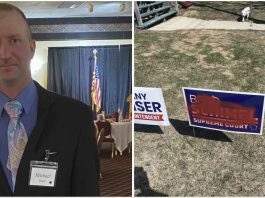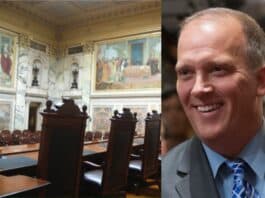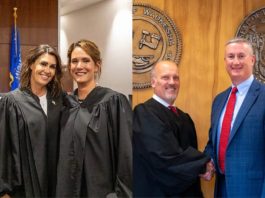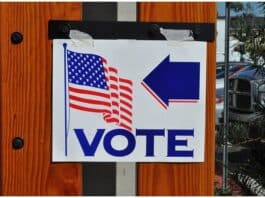Wisconsin law would allow President Joe Biden to withdraw from the race and be replaced by another candidate at the party’s convention in August, according to statutes and a top legal expert. However, if Biden doesn’t drop out and the Democrats want to replace him against his will, it gets a lot more complicated.
And candidates can only be replaced after they are nominated upon death.
Speculation has raged abut whether Biden might step down as a candidate or whether the Democratic National Committee could replace him since his often-incoherent debate performance this week. NBC News reported that Biden was discussing his future with his family on Sunday, June 30.
The laws on replacement vary by state.
The conservative Heritage Foundation is warning that laws around the country for replacement before and after a candidate is formally nominated are varied, very complex and could result in a legal quagmire or “absolute mess” if Democrats attempt to replace Biden or Biden quits the race. Heritage Foundation released this state-by-state analysis: DRAFT 50 State Review of Withdrawal and Substitution (1). It says that Wisconsin is “ripe for litigation” if Biden is removed.
The research shows that replacing Biden is an “absolute legal quagmire in the United States,” said Mike Howell, director of the Heritage Foundation’s Oversight Project.
He said the point of explaining “how complex and varying it is” state-by-state was to educate the public “this is not easy as abracadabra that a knight in shining armor can come in to replace Joe Biden.” He added that the Heritage Foundation “will not sit by and make such a thing easy to fail to adhere to the rules of the law.”

In Wisconsin, though, a top conservative legal expert believes it could be done – presuming Biden drops out.
“Sec. 8.16(7) essentially says that the persons nominated at the national convention are the party’s nominee for President and VP,” Rick Esenberg, president of the conservative Wisconsin Institute for Law and Liberty told Wisconsin Right Now.
“Those candidates must be certified to the commission by the first Tuesday in September. I read this to mean that the Dems can nominate whomever they want at convention. If they nominate [California Gov. Gavin] Newsom because Biden has dropped out, then he’ll be the candidate.”
Esenberg added: “Put differently, there is currently no Democratic candidate for President in Wisconsin and won’t be until the DNC chooses one in August.”
If Biden doesn’t drop out voluntarily, but the DNC wants to replace him anyway, Esenberg believes it gets a lot more complex and uncertain.
“Going further than that would require more work because you have a complex web of statutes and the complexity added by the fact that when you vote for President, you’re really choosing electors,” he added. “By law, they are supposed to vote for the candidate of their party but who would be considered that candidate and what would happen if they don’t vote for the candidate on the ballot would require more analysis. There is a web of statutes and even constitutional concerns.”
“Bottom line, I think that Biden can withdraw from the race and someone else can be nominated at the DNC. I also suspect that the DNC could change its rules and dump him, but that seems unlikely.”
The Heritage Foundation has been researching this topic for months. In an April memo, the Heritage Foundation wrote that three “of the expected six most contested states have some potential for pre-election litigation aimed at exasperating, with legitimate concerns for election integrity, the withdrawal process for a presidential candidate.”
The memo, obtained by WRN, says that Georgia, Nevada and Wisconsin “have specific procedures for withdrawal of a presidential nominee with differing degrees of applicability and timelines. WI does not allow withdrawal for any reason besides death.” In other words, after nomination, only death qualifies for replacement.
The memo cites Wis. Stat. Ann. § 8.35(1). However, as noted, that statute applies to “vacancies after nomination,” whereas, right now, Biden is the presumptive nominee.
That statute reads, “Any person who files nomination papers and qualifies to appear on the ballot may not decline nomination. The name of that person shall appear upon the ballot except in case of death of the person. A person who is appointed to fill a vacancy in nomination or who is nominated by write-in votes is deemed to decline nomination if he or she fails to file a declaration of candidacy within the time prescribed under sub. (2) (c) or s. 8.16 (2).”
The Heritage Foundation’s memo says that, throughout the country, there are hurdles to replacing Biden.
“Adherence to the law in some states may result in that process being unsuccessful for the purposes of another candidate being on the ballot.” Read the memo here: DRAFT Withdrawal and Substitution Memorandum – MH
The laws in the 50 states are not all set up to facilitate the replacement of a major party nominee, unless that candidate dies, the Heritage Foundation’s lawyers said in a June 28 press call, the day after Biden’s sometimes incoherent presidential debate appearance.
“If the Biden family decides that President Biden will not run for re-election, the
mechanisms for replacing him on ballots vary by state. There is the potential for pre-election litigation in some states that would make the process difficult and perhaps unsuccessful,” the memo says.
“Important caveats include the timeline and triggering events. For example, some states
allow withdrawal before the 74th day before an election, 12 and failure to adhere to these
timelines can result in the candidate’s name remaining on the ballot13 (which provides its own corollary of post-election litigation),” it adds. “Likewise, the rationale for withdrawal (death, medical, or other) can be outcome determinative. Some states, like South Carolina, do not allow withdrawal for political reasons.”
The Heritage Foundation held a press call on the topic the day after the presidential debate.
Howell, the director of the Heritage Foundation’s Oversight Project, said the memo was an “emergency” memo that culminated from research conducted for months. The team of researchers went through all 50 states for substitution or withdrawal of a candidate.
He said there are “varying ways to go about making such a change; some are limiting for the reasons a change can be made, such as death. Others have paperwork challenges and timelines.”
Heritage Foundation Chief Counsel Kyle Brosnan called replacing Biden a “legal quagmire. It’s not a simple fix to merely replace Joe Biden on the ballot” in some states,” he said. “We have a decentralized system where states run their own elections in this country. States have laws on the books governing removal from the ballot of candidates.”
“We are a nation of laws and we need to ensure those laws are indeed followed,” Brosnan added.
S






![Phil Gramm’s Letter to Wall Street Journal [Up Against the Wall]](https://www.wisconsinrightnow.com/wp-content/uploads/2025/03/gramm-265x198.png)





